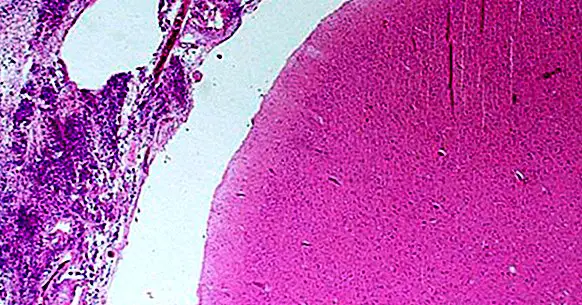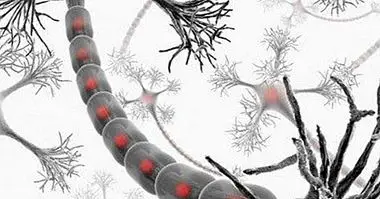Meningitis: causes, symptoms, treatment and prognosis
The brain is one of the most important organs , if not the one that more, of all our organism, since it governs and controls the different processes and functions that allow us to stay alive and that makes us be as we are. Fortunately the brain has the protection of various structures, such as the skull or a series of membranes called meninges.
However, sometimes there are alterations in these protective elements that can have serious consequences, as in the case of meningitis .
- Related article: "The 10 most frequent neurological disorders"
The meninges and their basic functions
The meninges are a series of three membranes located between the skull and the brain that exert numerous functions of great importance when it comes to protecting the brain and spinal cord.
These membranes, called dura mater, arachnoid and pia mater , they form a barrier that allows to cushion possible blows and traumatisms that could affect the integrity of the nervous system. They have several receptors that allow detecting possible brain alterations, something that otherwise would not be possible because the brain itself has no receptors of any kind.
In addition, they allow the generation of cerebrospinal fluid (specifically the choroid plexus of the arachnoid) and its flow around the nervous system, thanks to which it is possible to excrete residues of brain functioning while helping to nourish and stabilize the neuronal environment.
Finally, the meninges also they serve to structure and shape the brain and so that the level of intracranial pressure remains stable.
Meningitis: what is it?
The meninges, in short, are an element of great importance when it comes to protecting and maintaining the health of the thinking body. But nevertheless, There are different problems that can lead to these membranes being damaged and that in turn can cause damage to the nervous system. One of them is meningitis.
We understand meningitis as the process by which the meninges suffer inflammation due to an infection , this may be due to different causes. This also causes an alteration of the cerebrospinal fluid, which can affect the functioning of the brain beyond the mere pressure exerted on it. The brain pressure can increase greatly, while at the same time the balance of the environment in which the neurons act is altered . Meningitis is a high risk because it can affect the integrity of the nervous system, and even cause the death of the sufferer.
symptom
The symptoms of meningitis can vary depending on what the inflammation is like and what parts of the system it affects, but in general they can be found frequently. headaches, feelings of weakness and fatigue, decrease and even loss of consciousness . It is not uncommon for high fever, vomiting and dizziness along with dehydration to appear. Occasionally, perceptive alterations such as hallucinations and delusions occur, as well as some motor symptoms such as tremors and even seizures.
Meningitis can be divided into acute, subacute or chronic depending on their evolution . Meningitis is understood to be acute, evolving in less than twenty-four hours. The subacute are those in which there is a four of a day to a week of evolution, and the chronicles whose effects are manifested over four or more weeks.
Possible causes of this affectation
Meningitis can have a large number of causes, but in general they can be divided into viral and bacterial.
1. Bacterial meningitis
This type of meningitis is caused by an infection produced by the entry of certain bacteria in the body , such as pneumococcus, streptococcus or meningococcus. This entry may be due to trauma, pneumonia, immune and / or metabolic problems or even due to the body's own bacteria. They have a serious nature especially when they occur in children, the elderly and people with various diseases.
- Maybe you're interested: "The 3 types of bacteria (characteristics and morphology)"
2. Víricas
Viral-type meningitis is caused by certain viruses. They are also known as aseptic meningitis because they do not usually reflect the entry of microorganisms into the system. They tend to be mild, causing fevers, headaches and other symptoms of generally not too intense.
But nevertheless, there are special cases that are especially risky and serious . A special case is that caused by the herpes virus, since it tends to produce also encephalitis or inflammation of the brain which can cause fatal or disabling alterations in the patient's brain.
Another virus that cause meningitis is HIV , which due to the weakening of the immune system can produce complications.
3. Non-infectious
Although they are usually due to infections, sometimes inflammation of the meninges it may be due to other causes . For example, they can be produced as a reaction to certain drugs and psychotropic drugs, traumatisms, tumors and other diseases.
Treatment of this inflammation
The treatment of meningitis and its prognosis will depend to a large extent on its etiology, that is, its causes. You have to take into account the possibility that the bacteria and viruses that cause meningitis they can get infected , with which some caution is recommended with at-risk populations such as children under one year old or elderly.
Fortunately, many of the bacteria that are capable of causing meningitis have their vaccine, which is usually applied as early as childhood .
In cases of bacterial meningitis we are in a situation of seriousness in which It is necessary to apply antibiotics immediately . Due to the urgency of treatment, there is often no time to perform a culture and analysis of the bacteria, which often uses drugs that attack most of the bacteria that usually cause this problem.
Forecast
The prognosis will depend on the situation of each patient at the time of admission and if he has received timely treatment, age, the state of the immune system and the type of bacteria that causes it, there is a risk of death especially in children under one year old and in the elderly . In some cases, even if they are cured, they can have sequelae such as intellectual disability, epileptic seizures or loss of senses.
With regard to viral meningitis, as long as it does not cause inflammation of the nervous system as such, there is usually a complete cure without sequelae , in many cases disappearing by themselves. However, children, the elderly and people with autoimmune diseases or metabolic problems are at greater risk.
Regardless of what causes meningitis, it is also necessary to treat the symptoms that occur, c omo when seizures appear or in the case of dehydration . In the same way, possible edema and increased pressure in the nervous system should be treated.
Bibliographic references:
- Kandel, E.R .; Schwartz, J.H .; Jessell, T.M. (2001). Principles of Neuroscience. Madrid: McGraw Hill.
- Rosenberg, G.A. (2016). Brain edema and disorders of cerebrospinal fluid circulation. In: Bradley, W.G .; Daroff, R.B .; Pomeroy, S.L .; Mazziotta, J.C .; Jankovic, J. (eds). Bradley: Neurology in Clinical Practice. 7th ed. Philadelphia, Pa: Elsevier Saunders; 88
- Zweckberger, K .; Sakowitz, O.W .; Unterberg, A.W. et al. (2009). Intracranial pressure-volume relationship. Physiology and pathophysiology Anaesthesist. 58: 392-7.



















